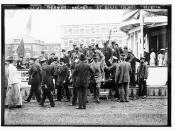Bismarck's treatment of the Polish population of Prussia, and his consequent defence of that treatment, like his handling of Prussian Catholics and socialists, is of interest both as a problem in itself but also for the insights it gives us into his understanding of the German nation. Bismarck's "Polish Problem" speech delivered to the Lower House of the Prussian parliament is a result of the brutal expulsion from Prussian territory of some 30,000 Poles carried out the year before (1885) and serves as a response to the opponents of that expulsion, the Polish Party and the Central party. It was this domestic parliamentary reaction to these expulsion measures, the fact that he was being held answerable for his actions, which makes transparent Bismarck's understanding of the German nation. Compelled to defend the expulsions before the elected representatives of the nation, Bismarck did so by means of an appeal to German nationalist feelings.
While this speech explains how Bismarck performed nationalism, it does not, I feel explain his own understanding of it. Bismarck, I will argue, was a state nationalist and his policy toward Poland and his understanding of the German nation was based much more upon his view of the necessities of state rather than upon national bigotry.
Although remarkable for the degree and tone of its anti-Polish vehemence the speech should be regarded as a ploy of statecraft. In this regard I will try to fit Bismarck's performance of nationalism in his speech on the "Polish Problem" into a picture of Bismarck as the state-nationalist statesman. Seen in this light, Bismarck's policies towards Prussian Poles can be seen as far removed from "the struggle for existence between the two nations which are allotted the same hearth" or "the defence of the German nation" which he...


